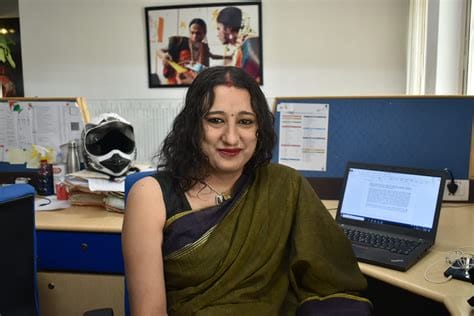We are pleased to introduce Amrita Sarkar, a dedicated and experienced change-maker in the field of transgender persons’ wellbeing and HIV advocacy, as the newly selected NGO Delegate to participate in the upcoming PCB (Programme Coordinating Board) meeting of UNAIDS, scheduled to take place from June 24 to 26. Amrita represents Alliance India, a leading organization in the fight against HIV/AIDS and the advancement of transgender rights in India.
With over 25 years of committed service to the transgender and LGBTQIA+ communities, Amrita’s journey is both inspiring and deeply rooted in personal experience. Born and raised in Kolkata, she grew up in a middle-class Bengali family during a time when Indian society and laws were hostile primarily to gender diversity. During her childhood and school years, she faced significant challenges, including a lack of acceptance and support for her gender identity.
Amrita’s early experiences under India’s then-criminalization of same-sex relationships (under Section 377 of the Indian Penal Code) and the absence of any legal protections for transgender persons ignited her lifelong commitment to community activism. Despite personal struggles, she persevered academically, earning a diploma in social work and community services, as well as certifications in counseling and public health.
Her activism began around the year 2000 with an HIV training program conducted by the Naz Foundation in London. Shortly thereafter, Amrita joined SATHI (Solidarity and Action Against HIV Infection in India) in 2005, where she progressed from field-level positions to national project management. At SAATHII, she helped lead transgender-specific initiatives aimed at capacity building, advocacy, and healthcare access.
One of Amrita’s landmark projects was the first national transgender capacity-building program in India (2010–2012), supported by the Canadian International Development Agency (CIDA) and implemented through the Integrated Network for Sexual Minorities (INFOSEM), India’s largest LGBTQIA+ network. This program empowered over 30 transgender organizations nationwide by enhancing their skills in project management, proposal writing, and sexual health programming.
Internationally, Amrita has been active since 2008, when she attended the International AIDS Conference in Mexico. There, she helped form the International Reference Group on Transgender Women and HIV/AIDS (IRGT) and collaborated with global partners, including USAID and the Global Forum on MSM and HIV (now known as MPact). She has contributed to global guidelines and capacity-building initiatives aimed at improving transgender health worldwide.
Currently, Amrita is addressing a critical challenge faced by many community organizations: funding cuts to HIV programs and the need for integrated healthcare approaches that encompass mental health and social support. At the upcoming PCB meeting in Geneva, she will advocate for sustainable funding models, public-private partnerships, and collaborative platforms that unite governments, donors, civil society, and affected communities.
Amrita’s story is a testament to resilience, lifelong learning, and passionate advocacy. From overcoming societal stigma in her youth to shaping policy at national and global levels, she embodies the strength of community leadership. Her role as NGO Delegate will bring valuable perspectives and renewed energy to UNAIDS’ mission of ending the AIDS epidemic.
We congratulate Amrita on this appointment and look forward to her contributions at the PCB meeting and beyond.
